Disclaimer: As an Amazon Associate I earn from qualifying purchases. Therefore, we may collect a share of sales from the links on this page, at no extra cost to you!
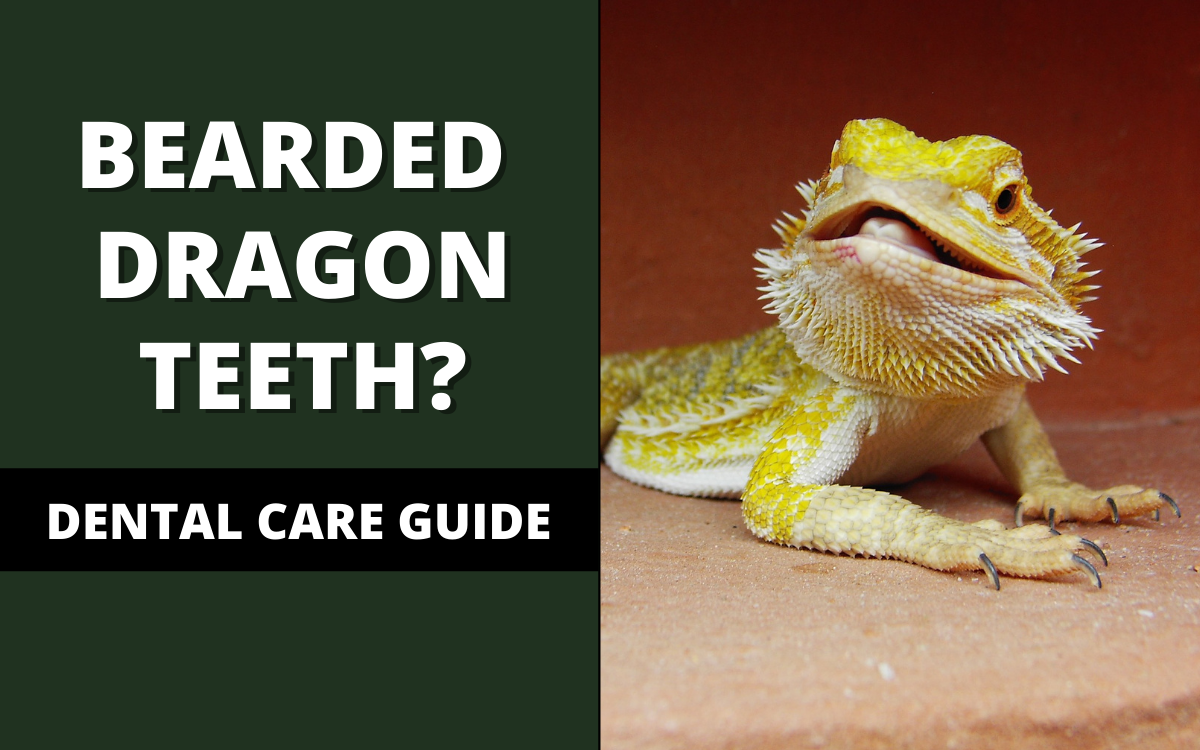
Bearded Dragon Teeth & Dental Care [Things You MUST Know!]
Bearded dragon teeth, similar to human teeth, require proper dental care. And no, you don’t have to whip-out your toothbrush and force it down your bearded dragons throat.
However, there are a few steps you can take to ensure your bearded dragons teeth are healthy and free of disease.
Within this article, we’re going to discuss various topics such as how many teeth a bearded dragon has, why bearded dragons have teeth, how to clean your bearded dragons teeth, different types of diseases, and dental care info you MUST know!
So, ladies and gents, strap on your seatbelts and let’s go!
Table of Contents
Do Baby Bearded Dragons have Teeth?
Yes, baby bearded dragons do in fact have teeth. Unlike humans, bearded dragons have teeth in the womb, and they are born with them!
Unlike humans that require liquids when they are developing, baby bearded dragons require solid food from day one. Female bearded dragons do not produce milk like humans do.
Therefore, in the wild, baby bearded dragons are immediately expected to hunt and chomp down food right away! If they didn’t have a full set of teeth, they simply wouldn’t be able to survive.
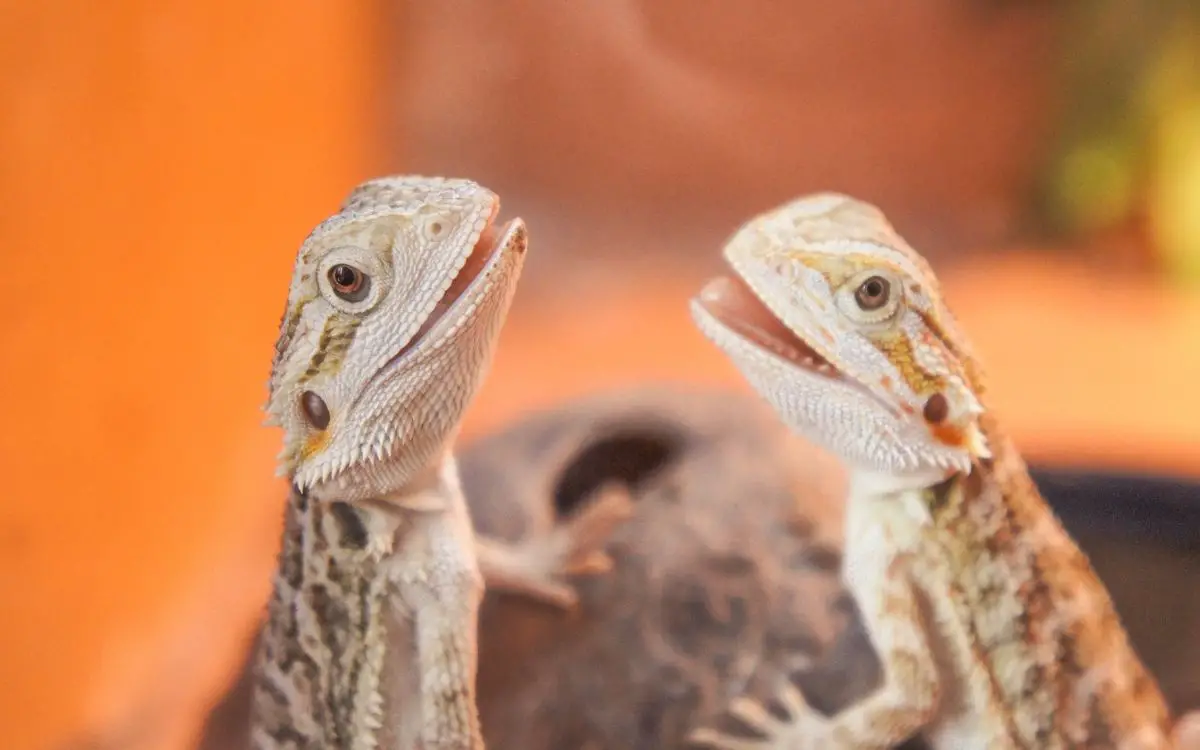
How Many Teeth Do Bearded Dragons Have?
So, not all bearded dragons have the same number of teeth – this answer will vary from beardie to beardie. However, generally speaking, bearded dragons have anywhere from 10-17 teeth in their upper jaw and 12-17 on each side of their lower jaw.
Again, the number of teeth a bearded dragon will vary depending on the species. However, this is not something to worry about because all bearded dragons require the same dental care.
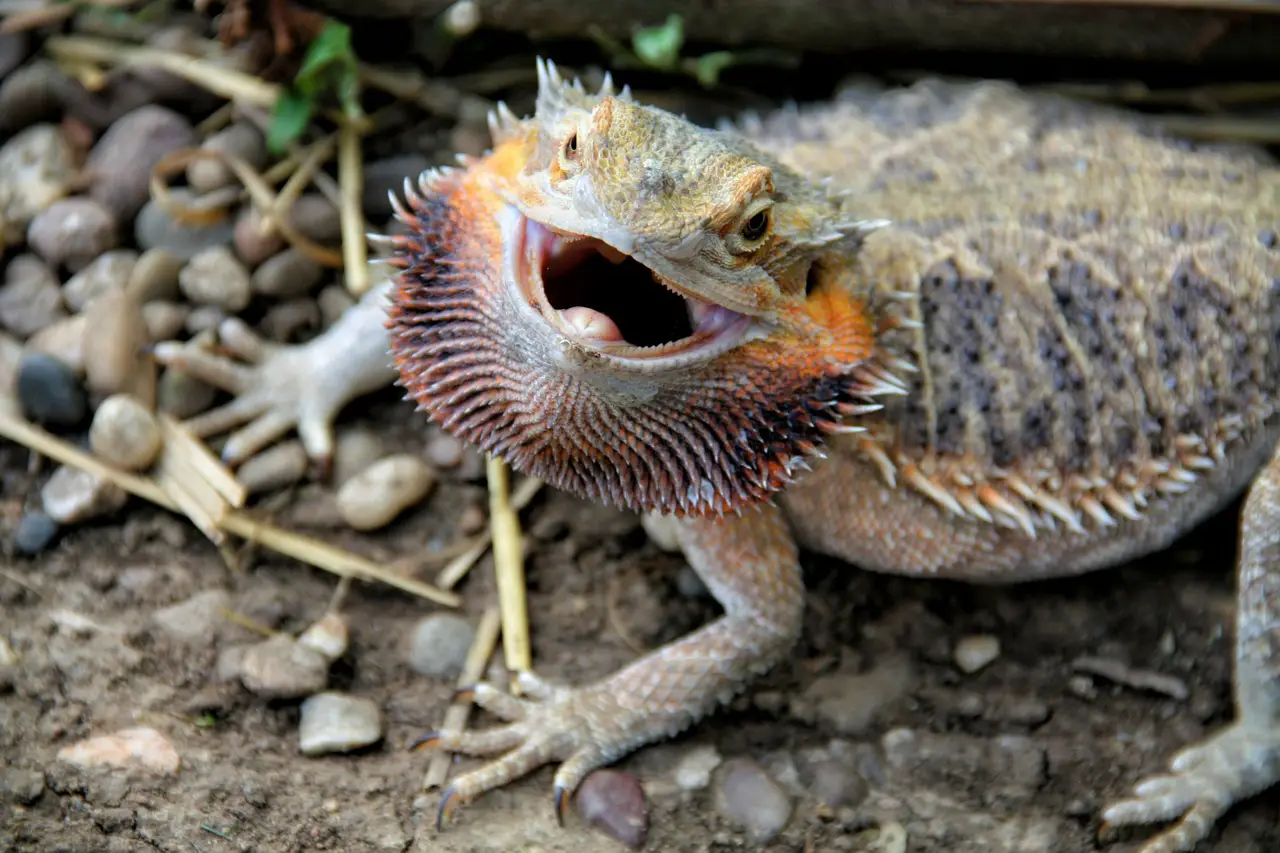
Dental Problems in Bearded Dragons
It’s actually incredibly important to pay mind to your bearded dragons teeth. Interestingly enough, bearded dragons in captivity are more prone to having dental disease than bearded dragons in the wild.
Unfortunately, there are multiple diseases that can occur if your bearded dragons teeth are left uncared for. Some of the most common occurring diseases include Gingivitis, Osteomyelitis, Mouth Rot, and debatably the worst of all, Periodontal Disease.
Let’s dive into greater detail on the different types of dental diseases in bearded dragons and how to identify if your scaly friend may suffer from one of them.
Gingivitis
Gingivitis, also referred to as gum inflammation, is the slow accumulation of plaque or bacteria on the teeth. Although gingivitis is non-destructive, it can lead to much more serious gum diseases such as periodontitis disease. Furthermore, gingivitis can result in your bearded dragons teeth falling out.
Osteomyelitis
Osteomyelitis is a very painful disease that is common in bearded dragons. In simple terms, Osteomyelitis is the separation of the teeth from the bone of the jaw. It can leave part of the gum exposed that otherwise shouldn’t be. As a result, your bearded dragon is more susceptible to catching a deadly infection!
Mouth Rot
Mouth rot is another serious illness that can lead to a lack of appetite, bloating, loose/missing teeth, and even bleeding gums. As you can imagine, mouth rot can be very serious if left untreated. However, if caught early, you can treat it at home with a vet-recommended solution called Betadine. Some signs of mouth rot include white pockets of pus in the mouth and rotting teeth.
Periodontal Disease
Periodontal Disease is a very serious gum infection that can lead to tender and painful gums. If left untreated, Periodontal Disease can destroy the jawbone, cause the teeth to harden, and lead to tooth loss. In serious cases, it may require surgery. Additionally, periodontal disease can also mean that your bearded dragon has both gingivitis and osteomyelitis.
Keep in mind, these are just the most common diseases and there are various other diseases that can cause your bearded dragon to suffer.
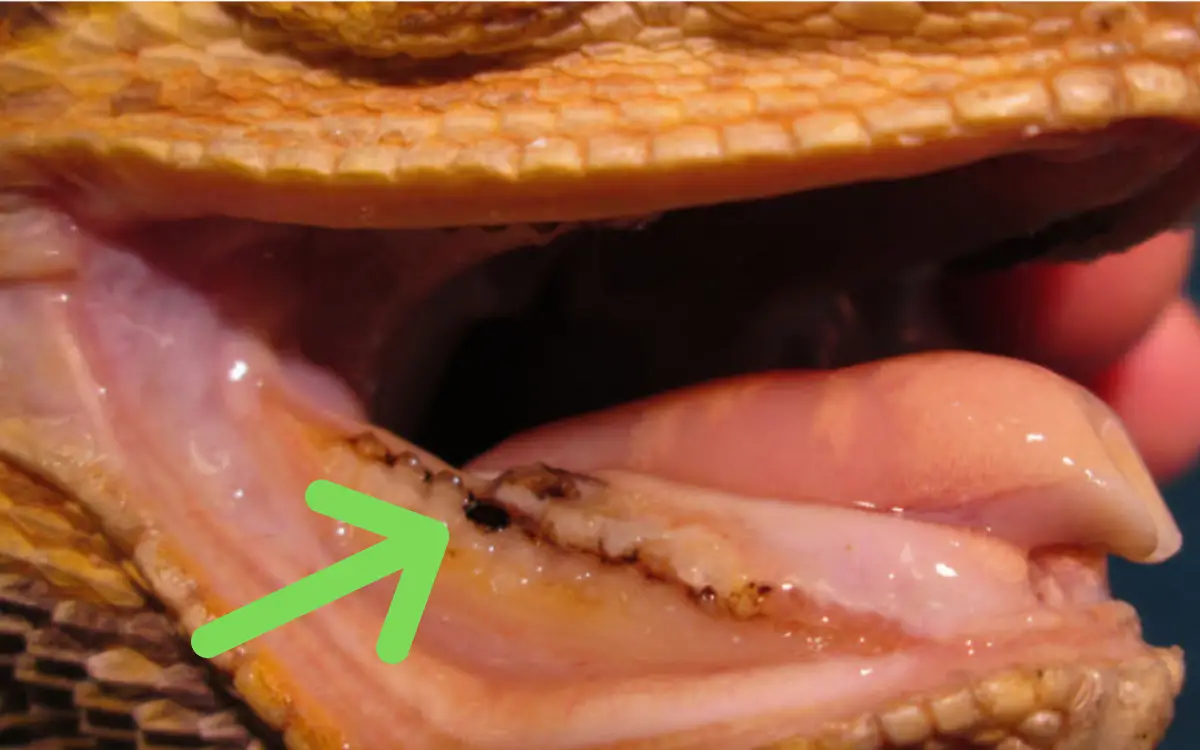
Causes of Dental Disease
There are a number of reasons why your bearded dragon may contract a gum/tooth disease. Below are some of the various causes and how they occur.
Improper Diet
A bad diet is the number one cause of dental disease in bearded dragons. Feeding your bearded dragon too many soft foods is typically the culprit. Some of these soft foods include wax worms, fruits, and certain soft veggies such as sweet potato and collard greens. A diet that is mostly consistent of soft foods can be very bad for the dental hygiene of your bearded dragon.
Additionally, feeding your bearded dragon too many sugary foods can lead to plaque buildup and result in gum disease. For instance, feeding your bearded dragon watermelon and other sugary fruits on a daily or weekly basis can lead to tooth decay over time.
Lastly, bugs are a common cause of plague buildup. Certain bugs, such as butterworms or woodworms, are generally the worst types of bugs when it comes to dental issues. These bugs are very soft and get caught in the gums and leave a sticky film of bacteria. The accumulation of bacteria and plaque buildup overtime is what leads to disease.
Infection
The next reason bearded dragons develop dental disease is due to infection. Over time, as plaque and bacteria slowly accumulate, inflammation will begin to occur in the gum tissue. This plaque and bacteria produce toxins that can cause irritation and eventually lead to disease that can cause further complications.
Trauma
Finally, the last and less common cause of gum disease in bearded dragons is trauma to the teeth. This can include accidentally being hit by a person in the teeth, falling off a rock, or being smacked by another bearded dragon. Diet can also play a role in teeth trauma as certain foods can be too hard for your bearded dragons teeth.
How To Keep Your Bearded Dragons Teeth Healthy
Fortunately, these diseases are more than preventable with a few simple steps. Rather than having to deal with the disease after its occurred, its best to take the following precautions to avoid ever having to deal with them.
Improve Your Bearded Dragons Diet
The first and most important thing you can do to prevent a disease from infecting your bearded dragon is to ensure you’re providing it a healthy diet.
While foods that are soft may seem like a good idea because they’re easy to chew and swallow, it’s actually the opposite. As we mentioned earlier, soft foods lead to buildup of plaque and bacteria.
Therefore, you should keep the soft foods to a minimum. Worms such as waxworms or woodworms should only be fed as a treat and should not replace your bearded dragons primary diet sources.
Keep in mind, soft foods are okay as long as you’re giving your bearded dragon crunchy foods as well. The soft foods get stuck in your bearded dragons teeth, but solid foods such as iceberg lettuce, squash, and crickets help to break up the mush.
Below is a list of solid foods and soft foods that you can feed your bearded dragon. Balance is key; so when you feed your bearded dragon a soft food, be sure to follow up with a crunchy/solid food.
Avoid Sugary Foods
Furthermore, you should keep the sugary foods to a minimum. Bearded dragons are known to love sweet fruits such as strawberries and watermelon. However, even though these fruits do contain many vitamins and nutrients that are healthy for your bearded dragon, they also contain high levels of sugar. Sugar, if fed too often, can lead to tooth decay.
Be sure to only feed these sugary treats on rare occasions. If you do choose to feed your bearded dragon different fruits, we suggest only giving it to them once every two weeks at the most.
Don’t Forget About Calcium Powder
Calcium is crucial to your bearded dragons health. That is why you must cover your crickets in calcium powder to ensure they receive the proper amount of calcium in their diet. Calcium directly affect the development and maintenance of the teeth and bones in your bearded dragon.
Therefore, if you do not give your bearded dragon the proper intake of calcium, they can end up with issues with their teeth resulting in disease. Additionally, your bearded dragon could end up with Metabolic Bone Disease.
Install The Proper UVB Lighting
This brings us to the next important topic, lighting. As you already know (if you currently own a bearded dragon), lighting is crucial for your bearded dragons health.
In fact, UVB lighting directly affects your bearded dragons natural ability to absorb calcium. Without proper UVB lighting, your bearded dragon won’t be able to properly retain its calcium.
As a result, your bearded dragon will suffer from a lack of calcium. As we mentioned, calcium is a crucial part of the health of your bearded dragons teeth and other bones.
Be sure to always have a UVB bulb and provide an area in your enclosure where your bearded dragon can bask under the light.
Prevent Your Bearded Dragon from Hurting Itself
As mentioned earlier, a less common, but very possible way that your bearded dragon can develop a gum disease is through trauma. Trauma can be caused by a number of things, but luckily, it’s usually very easy to prevent.
Don’t allow your bearded dragon to get too high-up in its enclosure. If you have a high log that your bearded dragon can climb on, it could easily fall on its face and damage its teeth. Therefore, keep your logs and rocks low to the substrate so your bearded dragon won’t be able to fall from a high distance.
Additionally, if you have another bearded dragon in the same enclosure, be sure that they get along at all times. Sometimes bearded dragons fight for dominance reasons or over food. In this scenario, one of your bearded dragons could easily get slapped in the face and your bearded dragons teeth or gums could be damaged.
Examine Your Bearded Dragons Teeth Regularly
Finally, the last preventative method you should implement is to start checking your bearded dragons teeth on a regular basis.
Simply lodge your bearded dragons mouth open and check the top and bottom jaw. Be on the lookout for brown spots, food stuck in the teeth, or plaque buildup on the teeth and gums.
If you do see one of these signs, you don’t need to freak out right away. In fact, most of these signs are completely normal. Unless your bearded dragon has black spots on its gums, lots of teeth missing, or is in obvious pain, it is not an emergency.
Simply start feeding your bearded dragon more crunchy foods. This will help your bearded dragons teeth as it will break up the buildup of food and plaque.
Should You Brush Your Bearded Dragons Teeth?
Should you brush your bearded dragons teeth? Well, it’s up to you.
Most people do not brush their bearded dragons teeth and they never run into any issues. However, it can definitely benefit your bearded dragon, especially if they have a lot plaque buildup.
Although it may benefit your bearded dragon, they’re probably not going to like it. If you do end up brushing your bearded dragons teeth, be very cautious. Even though bearded dragons are famously known for their docile nature, they can bite if they feel threatened.
How to Brush Your Bearded Dragons Teeth
So, how do you brush a bearded dragons teeth? Well, you’re definitely not going to do it with your toothbrush and toothpaste.
Instead, you’re going to want to grab some Chlorhexidine Solution and a cotton swab or Q-tip. Dilute the Chlorhexidine in water and pour a small amount on the cotton swab or Q-tip.
Next, gently pry open the side of your bearded dragons mouth with the Q-Tip or cotton swab and proceed to gently scrub their teeth and gums.
You do not need to apply much pressure or force your bearded dragons mouth open.
Remember not to use human toothpaste as it can be toxic for your bearded dragon.
Of course, you should feel-out your bearded dragon in the process of doing this. If they hiss or show signs of aggression, it’s probably best to simply feed them some solid foods instead of trying to brush their teeth. As we mentioned earlier, solid food essentially acts as a natural teeth cleaner.
Be sure to watch the video below to gain a better understanding of how to clean your bearded dragons teeth.
Frequently Asked Questions (FAQ)
People typically have a lot of questions when it comes to bearded dragons teeth. Therefore, this list will answer some of the most commonly asked questions regarding bearded dragons teeth, temperament, and dental hygiene.
How Often Should I Brush My Bearded Dragons Teeth?
So, if I decide to brush my bearded dragons teeth, how often should I do it?
Good question. This is really dependent on you and your bearded dragon.
If your bearded dragon hates getting its teeth brushed and displays signs of aggression or irritation, you probably should avoid hand-cleaning their teeth altogether.
However, if your bearded dragon is okay with you brushing its teeth, simply clean them when they’re dirty! More than likely, this won’t be too often – maybe once every month or two.
Although, if you feed your bearded too many soft foods without giving them an equal amount of crunchy foods, it’s more likely their teeth will get dirty quicker.
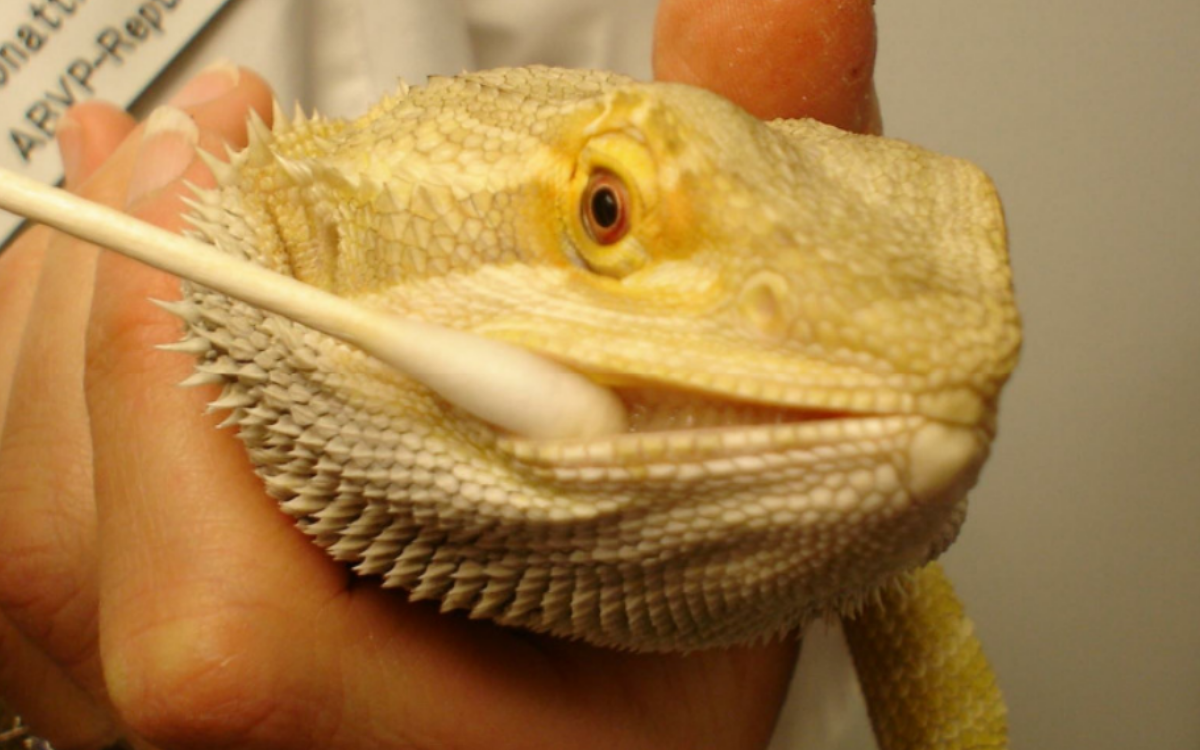
Are Bearded Dragons Teeth Sharp?
Similar to a puppy, bearded dragons have very sharp teeth when they are babies. This is because their digestive system and organs are still developing so they must be able to chew up their food very finely in order to digest it.
Unfortunately, bearded dragons are known to get impaction, or suffering from a blockage in the digestive tract, so it’s especially important that they’re able to chew up their food in order to swallow and digest it.
However, as bearded dragons get older, their teeth tend to become less sharp.
Do Bearded Dragons Bite?
Bearded Dragons are known for their docile nature and love for human interaction.
Even when bearded dragons do feel threatened, like most reptiles, they will first try to run and hide. This is because they are smart enough to know, they will not win a fight with a human that is much bigger than them.
However, you are dealing with an animal and any animal is capable of biting you. It’s just something we have to accept.
Although generally, if you regularly handle your bearded dragon, it’s much less likely it will feel threatened or afraid of your presence.
Is a Bearded Dragon Bite Painful?
Remember, bearded dragons have fairly sharp teeth that are intended to rip through crickets and other bugs. This is especially true for juvenile bearded dragons that need to eat as soon as they are born.
However, a bite from a bearded dragon, although rare, can be painful. Most people report anything from a light pinch to a cut. They can draw blood if their teeth move against your skin.
Overall, bearded dragons rarely bite, even when untamed, so this is not an issue you should be overly concerned about.
Do Bearded Dragons Have Venom?
Luckily, bearded dragons do not have venom. Unlike some other reptiles, bearded dragons feed on small prey such as crickets and worms that they can simply chomp-down on without having to kill first.
Conclusion
Hopefully, you learned something new about bearded dragon teeth and their proper dental care.
Bearded Dragons make excellent pets and they are generally very easy to take care of. If you’re thinking about getting a bearded dragon, you definitely should!
Regarding their dental care, be sure to give your bearded dragon an even mix of soft and solid foods.
A diet consistent of solely soft foods can lead to dental diseases over time.
If you need to, save this page so you can refer back to the chart outlining the different types of soft and hard foods you can give your bearded dragon.
A healthy bearded dragon is a happy bearded dragon – and a happy bearded dragon leads to a happy owner!

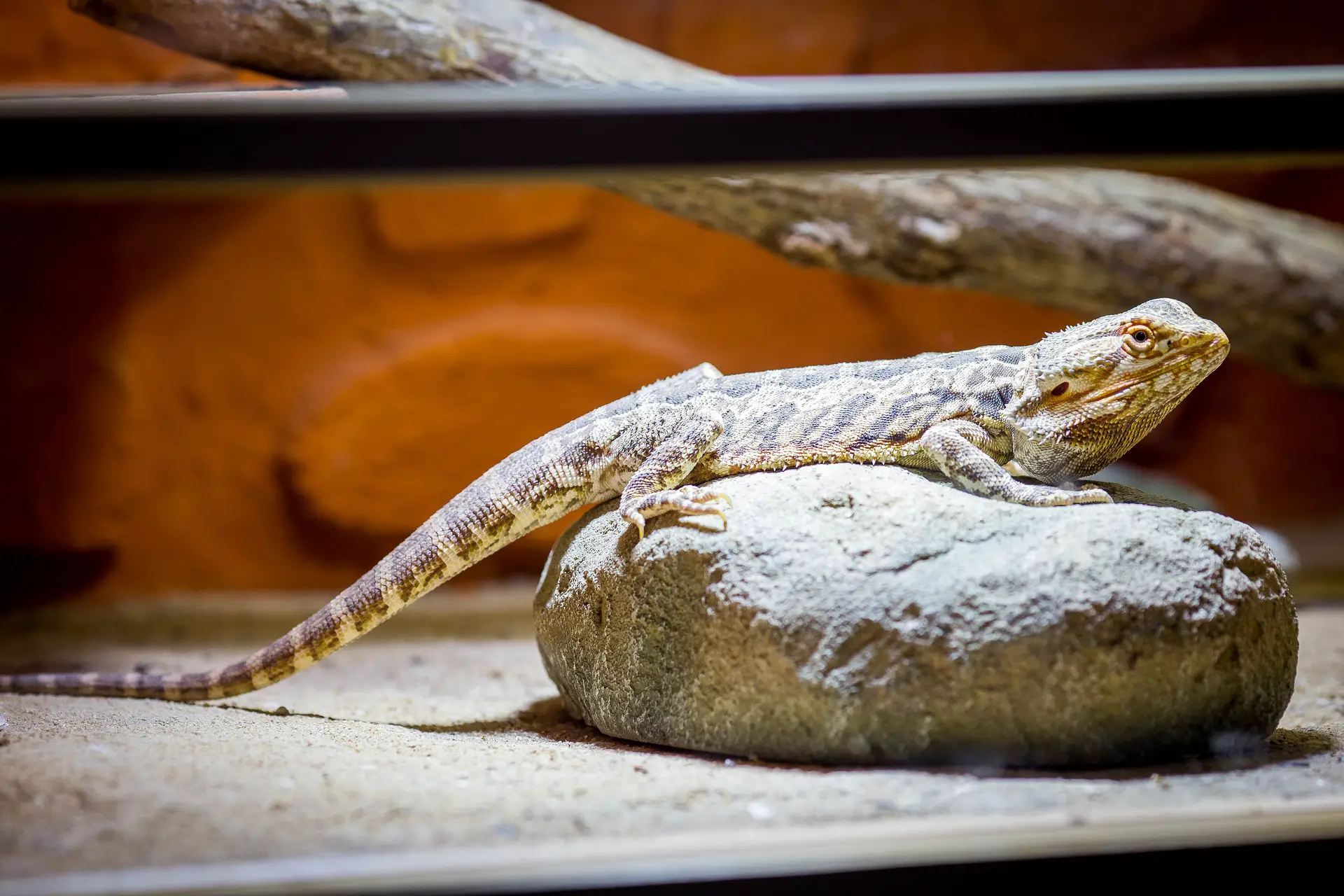
One Response